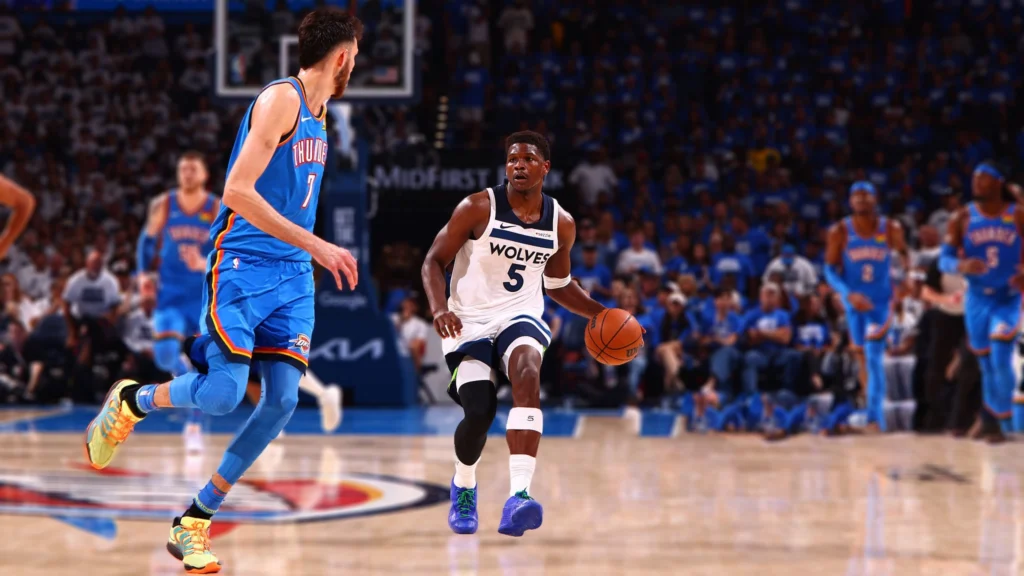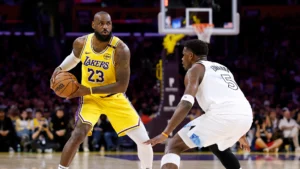
The dream of a deep playoff run, one that captivated a passionate fanbase, culminated in a sobering reality for the Minnesota Timberwolves. Their captivating journey through the Western Conference Playoffs met an unyielding roadblock in the form of the top-seeded Oklahoma City Thunder, culminating in a 4-1 series defeat in the Timberwolves Western Conference Finals. While the sting of elimination lingers, a dissection of the series reveals a confluence of factors that ultimately decided the outcome against a truly formidable opponent.
From the outset, the Thunder’s defensive prowess proved to be the ultimate disruptor. Oklahoma City, boasting the league’s top-rated defense, systematically dismantled the Timberwolves’ offensive rhythm. Their relentless pressure, particularly on star guard Anthony Edwards, limited his impact in crucial moments. The Thunder’s ability to switch effectively, contest shots without fouling, and recover quickly forced Minnesota into contested looks and hurried possessions. The stark reality was evident in the Timberwolves’ offensive struggles, none more glaring than their season-low 9 points in the first quarter of the pivotal Game 5, a clear indication of how effectively the Thunder stifled their attack. This offensive malaise was compounded by a crippling propensity for turnovers; the 21 turnovers in Game 5 alone provided the Thunder with easy transition opportunities, fueling their own offensive surge and effectively widening the chasm between the two teams.
The Timberwolves’ Achilles’ heel, their inconsistency on the road, was painfully exposed in this series. While they demonstrated flashes of brilliance and resilience throughout the playoffs, particularly at home, their performances away from Minneapolis often lacked the same intensity and execution. Following emotionally charged losses at home, their confidence seemed to waver on enemy territory, leading to a noticeable dip in offensive efficiency and defensive tenacity. This pattern of road fragility proved detrimental against a team of the Thunder’s caliber, who capitalized on every lapse in concentration and execution. The atmosphere in Oklahoma City was electric, and the Thunder fed off their home crowd’s energy, further amplifying the pressure on the visiting Timberwolves.
Beyond Minnesota’s internal struggles, the undeniable excellence of the Oklahoma City Thunder cannot be overstated. As the top seed in the Western Conference, they validated their regular-season dominance with a truly comprehensive playoff performance. Led by the transcendent talent of Shai Gilgeous-Alexander, who rightly earned the series MVP honors, the Thunder showcased a balanced attack and a tenacious defense. Chet Holmgren’s defensive impact and timely scoring, coupled with Jalen Williams’ versatile offensive contributions, provided the Thunder with a multi-faceted attack that the Timberwolves struggled to contain. Every time Minnesota attempted to build momentum or mount a comeback, the Thunder had an immediate answer, often through a clutch basket or a game-changing defensive stop. Their depth and ability to get contributions from multiple players allowed them to maintain a high level of play for longer stretches than the Timberwolves.
Perhaps most tellingly, the Timberwolves’ lack of competitive fire in their first taste of elimination in Game 5 was a significant factor. Facing the prospect of their season ending, the team appeared to lack the grit and determination that had characterized their earlier playoff victories. The early blowout in Game 5 suggested a team that, for whatever reason, failed to rise to the occasion when their backs were truly against the wall. This perceived surrender, whether due to fatigue, mental strain, or simply being overwhelmed by a superior opponent, was a stark contrast to their earlier resilient performances. Individual inconsistencies also played a role. While Anthony Edwards showcased flashes of brilliance throughout the playoffs, his production was limited in key moments of the series, particularly when the Thunder’s defense keyed in on him. Similarly, other vital players, such as Julius Randle, who struggled in the first half of Game 5, failed to consistently deliver the offensive punch needed to complement Edwards and challenge the Thunder’s defensive fortress.
In conclusion, the Minnesota Timberwolves’ Western Conference Finals exit was a complex outcome, a convergence of their own struggles with offensive consistency and road performance, amplified by the sheer dominance and depth of the Oklahoma City Thunder. While the experience will undoubtedly serve as a valuable learning curve for this young and talented Timberwolves squad, the Thunder’s excellence and ability to exploit Minnesota’s vulnerabilities ultimately sealed their fate in the Timberwolves Western Conference Finals.

